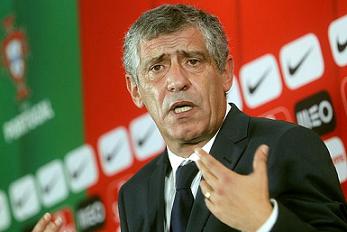This time last year Portugal were gearing up for the 2014 World Cup with high hopes. What transpired in Brazil was an unmitigated disaster and it’s been all change in the Seleção since.
Paulo Bento was replaced by Fernando Santos, and seven months after taking charge of the national team the new coach has steadied the ship and put Portugal on course for Euro 2016 qualification. Together with the roaring success of the U21s, the future again looks promising for the Seleção.
Santos certainly thinks so, and is unafraid to push the bar high: “The target I have set is to win the European Championship.”
Without setting the world alight, Portugal under Santos have clocked up three wins out of three competitive matches, putting the team in command of Qualifying Group I. The solid start to his tenure, together with the reduction of the FIFA ban hanging over Santos from 8 to 2 matches, has strengthened his position at the helm of the team, and the 60-year-old coach has given a series of upbeat interviews in recent weeks.
Team-building
“I set the target of winning the European Championship and to make it possible we have to create a team that can arrive in France in 2016 with all its processes working perfectly,” Santos told Record in an interview earlier this month. “To do so we have to get there in good shape, and above all as a great team. Both Euro 2012 and last year’s World Cup clearly showed this: the side that was more of a team ended up winning the tournament.”
In a previous interview on TSF radio Santos also lifted the lid on how his coaching team go about the task of selecting Portugal’s squad, revealing some interesting methods.
“The way we work is we have four players identified for every position, plus a further three on standby, so that’s 77 players we are closely monitoring. Of course, we are always paying attention and if a player starts performing in a manner that deserves it, he is immediately added to these names. The first thing we did when I became Portugal coach was to draw up this list of players who are the most likely to be called up.
“One has to remember this. When we look at an individual player such as André André or Bruno Fernandes who everybody is saying should be called up, and we analyse that player in isolation, it’s easy to arrive at the conclusion that he should be in. But when we look at all the players who are available for that position, such as André Gomes, Tiago, William Carvalho, Moutinho, João Mário… we have maybe 8, 9 or 10 good options.
“So what happens? We look at these 9 or 10 players then make our choice in the light of other factors, of what they can bring to our game. And we have to select players who have different characteristics from one another. Very often, the three players who are in the best form play in exactly the same position, and in the same way, and we’re not going to select all three – it doesn’t serve for anything.”
No rush to renew
The slowness of the transition from the old guard to take advantage of Portugal’s rich crop of young talents is one area in which the coach has attracted criticism. Santos believes it is a natural process, and not one that should be rushed. The veteran coach again turned to statistics when asked to explain how the decision is made as regards keeping a player in the U21 squad or calling him up to the seniors.
“When thinking about selecting U21 players I say to myself, ‘does the player have a 50% chance or better of playing?’ If so I select him, if not then I don’t, because it’s also important to play in the U21s to keep developing, then in one or two years he will not have just a 20% chance of playing for the seniors, but instead perhaps a 100% chance.
“In the current U21 side we have 18 or 19 players who will be ready, not for next year’s Euro, but for the 2018 World Cup. They will soon be the basis for the future team.”
Portugal resume their Euro 2016 qualifying campaign on 13 June when they travel to Armenia.

By Tom Kundert


